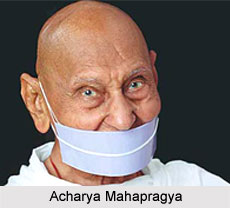 Acharya Mahapragya is the tenth Acharya of Terapanth. He was born in a small and serene village of Tamkor in the Jhunjhunu District of Rajasthan. He was born on 4th June 1920 to father Tolaram and Mother Baluji. He was named as Nathmal. His father died when he was an infant of one and a half months.
Acharya Mahapragya is the tenth Acharya of Terapanth. He was born in a small and serene village of Tamkor in the Jhunjhunu District of Rajasthan. He was born on 4th June 1920 to father Tolaram and Mother Baluji. He was named as Nathmal. His father died when he was an infant of one and a half months.
Early Life of Mahapragya
In those times there was no school in Tamkor. Thus the only means of education was to attend a tutor`s school. Sardarsahar was his uncle`s native place. Nathmal used to visit Sardarsahar quite often with his mother but the prospect of education was equal to none. Once Nathmal met Acharya Shree Kalugani whose profound personality left an intense impact on Nathmal`s mind. Thus he and his mother requested Acharya Shree for accepting them as his pupils. The saint accepted their request and the child and with his mother left the narrow path of ignorance and joined the highway that lead towards enlightenment. The path they chose to take reaches out to every door, varying from end to infinity, from immortality to eternity and from spirituality to enlightenment. Nathmal was thus initiated into an ascetic life at the age of ten.
Later Life of Mahapragya
Acharya Mahapragya and Acharya Shri Tulsi shared an extraordinary and loving relationship between themselves. Acharya Mahapragya from the very beginning remained very dedicated towards Acharya Tulsi. In the year 1955, Acharya Tulsi nominated him as the Chief Secretary of Terapanth. Acknowledging the spectacular knowledge and erudition of Acharya Mahapragya, once again Acharya Tulsi conferred on him the epithet of "Mahapragya" (a great seer) at Gangasahar, in the year 1978. On 4th February 1979 he was again nominated as the successor-designate, at Rajaldesar and his name was changed to "Mahapragya." It was from then onwards that he came to be known as "Yuvacharya Mahapragya." He was also conferred the epithet of Jain-Yoga Punaruddharka by Gurudev Tulsi. It was bestowed upon him in recognition of his distinctive researches in the field of Jain Meditation and Yoga.
On 18th February 1994 at Sujangarh Acharya Shri Tulsi announced the relinquishment of his post of Acharya and conferred it on Yuvacharya Mahapragya. Later on, in a function held at Delhi on 5th February 1995, he formally consecrated him as the tenth Acharya of Terapanth.




















